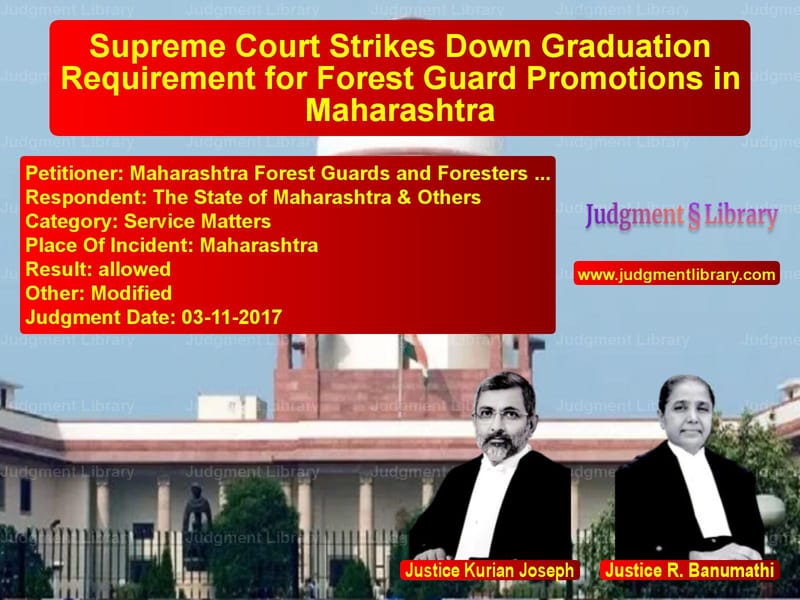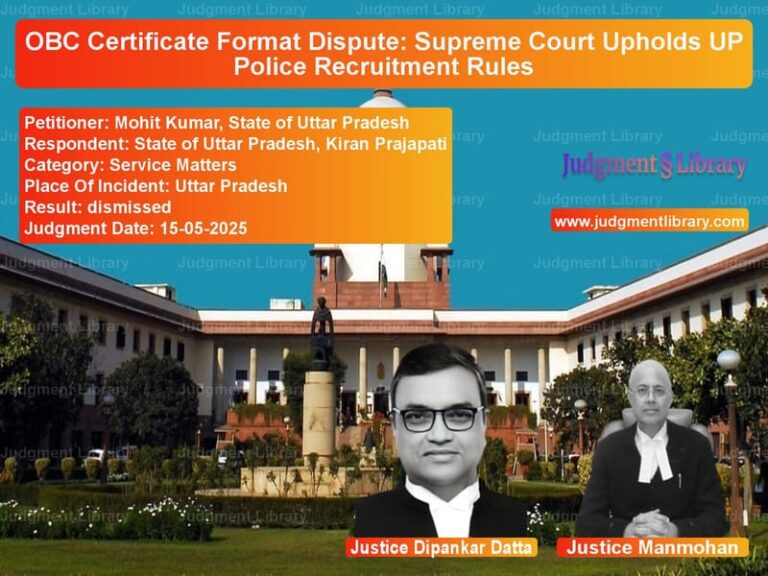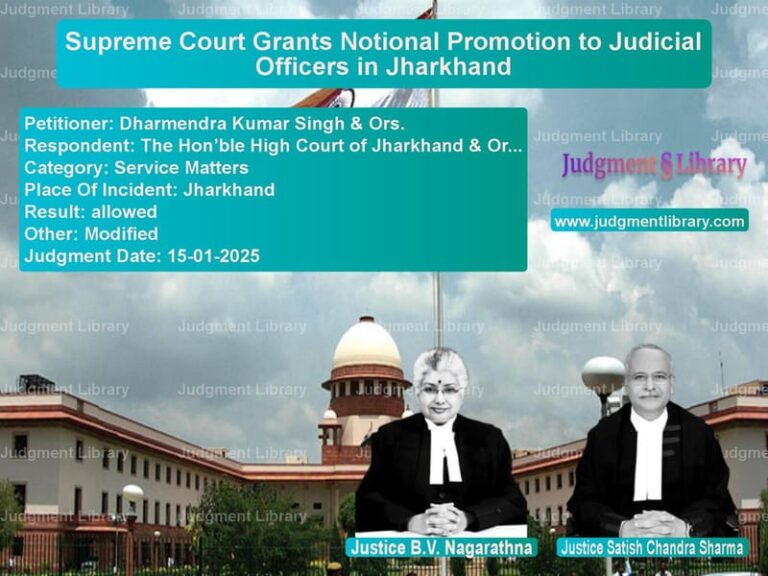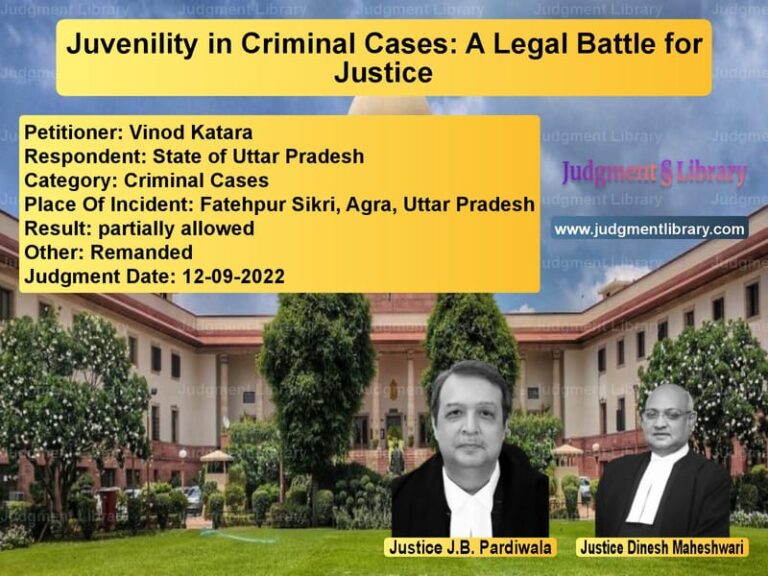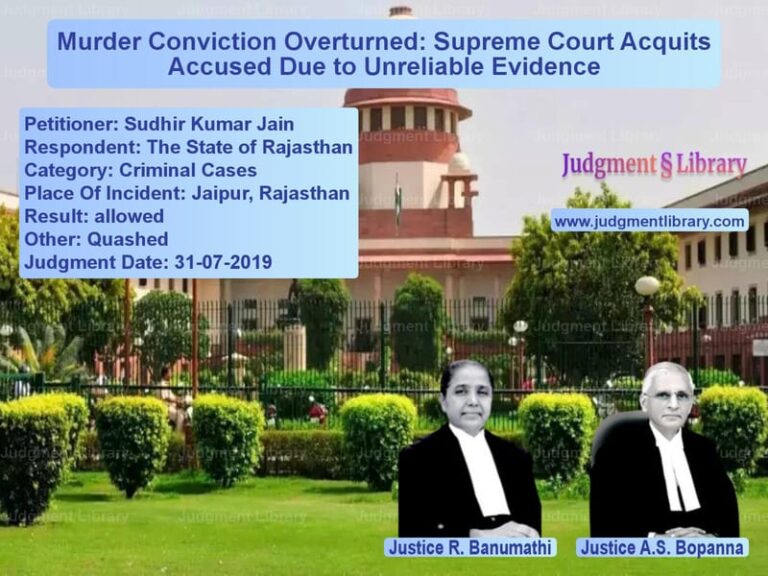Supreme Court Strikes Down Graduation Requirement for Forest Guard Promotions in Maharashtra
The Supreme Court of India recently ruled on the case of Maharashtra Forest Guards and Foresters Union vs. The State of Maharashtra & Others, addressing a challenge to the eligibility criteria for the Limited Departmental Competitive Examination (LDCE) for promotions within the Maharashtra Forest Department. The Court examined whether the restriction requiring only graduates to participate in the LDCE violated Articles 14 and 16 of the Constitution of India.
Background of the Case
The Maharashtra Forest Department follows a structured promotion policy under the Forest Guard, Forester, Ranger-Surveyor, Surveyor, Head Clerk, Accountant, and Clerk-cum-Typist (Recruitment) Rules, 1987. These rules prescribe the educational and service qualifications for appointments and promotions.
According to the 2013 amendment to these rules, 75% of Forester posts were to be filled based on seniority-cum-fitness, while 25% of the posts were to be filled through the LDCE. The challenge arose because the new rules required candidates appearing for the LDCE to possess a graduate degree, even though the minimum qualification for Forest Guards was only a Higher Secondary School Certificate (HSSC).
The petitioners, represented by the Maharashtra Forest Guards and Foresters Union, challenged this rule, arguing that it unfairly restricted promotion opportunities for experienced non-graduate Forest Guards.
Arguments of the Petitioners
- The petitioners contended that the requirement of a graduate degree to appear for the LDCE was discriminatory as it created an artificial class within the same cadre.
- They argued that the experience gained by working as a Forest Guard was more relevant to the job than formal education.
- They pointed out that this new qualification criteria unfairly excluded non-graduate but experienced Forest Guards from competing for promotions.
- The rule violated Articles 14 and 16 of the Constitution, which ensure equality of opportunity in public employment.
Arguments of the Respondents (State of Maharashtra)
- The respondents defended the rule, arguing that the graduate qualification was introduced to bring young and educated professionals into higher ranks.
- They contended that higher educational qualifications improve decision-making abilities and would enhance administrative efficiency.
- They cited previous Supreme Court rulings that allowed classification based on educational qualifications.
Supreme Court’s Observations and Judgment
The Supreme Court thoroughly examined the rule and found that it violated the principles of equality enshrined in Articles 14 and 16. The Court stated:
“If young graduates are otherwise intellectually sharp and educationally proficient, they would prove to be more meritorious in the competitive LDCE. However, as the Rules now stand, opportunity has to be thrown open to the youngsters who are non-graduates also in the seniority list but who have completed the required number of years of service and yet are otherwise alert, efficient, and proficient.”
1. Educational Qualifications Cannot Create an Artificial Class
The Court held that creating a separate class within the same cadre based on education was unconstitutional:
“Denial of the same would certainly be violative of Articles 14 and 16 of the Constitution.”
2. Experience Matters in Promotions
The Court acknowledged the importance of experience in Forest Guard promotions:
“The whole purpose of the LDCE is to encourage and facilitate the Forest Guards to get accelerated promotion on the basis of merit. Since seniority is the criterion for promotion to three-fourths of the posts, one-fourth is given a chance to compete in a competitive examination. In that situation, introducing an additional restriction of graduation for participation in the LDCE without there being any quota reserved for graduates will be discriminatory.”
3. Previous Supreme Court Rulings on Educational Qualifications
The Court examined precedents such as Roshan Lal Tandon v. Union of India, State of Mysore v. P. Narasing Rao, and Jammu and Kashmir v. Triloki Nath Khosa, but found that those cases dealt with separate categories of employees, whereas the present case involved an artificial distinction within the same cadre.
4. Equal Opportunity in LDCE
The Court ruled that the LDCE must remain open to all eligible Forest Guards:
“The Forest Guards, irrespective of educational qualifications, having formed one class for the purpose of participation in the LDCE, a further classification between graduates and non-graduates for participating in the LDCE is unreasonable. It is a case of equals being treated unequally.”
Final Judgment
The Supreme Court struck down the graduate qualification requirement for the LDCE as unconstitutional. However, the Court clarified that past promotions made under the old rule would not be disturbed, but all future promotions would follow the revised eligibility criteria.
“Rule 7(2) of the Recruitment Rules, to the extent that it imposes the requirement of being a graduate, is declared unconstitutional. However, this judgment shall not affect the promotions already made. But for further promotions, the LDCE shall be held afresh granting opportunity to all eligible Forest Guards.”
Conclusion
The Supreme Court’s ruling reinforces the principle that experience should be valued alongside educational qualifications in public service promotions. By striking down the arbitrary restriction, the Court ensured that non-graduate Forest Guards received a fair opportunity to compete for higher posts.
This judgment sets a precedent for future cases involving promotional exams and serves as a landmark ruling on the balance between education and experience in government service.
Don’t miss out on the full details! Download the complete judgment in PDF format below and gain valuable insights instantly!
Download Judgment: Maharashtra Forest G vs The State of Maharas Supreme Court of India Judgment Dated 03-11-2017.pdf
Direct Downlaod Judgment: Direct downlaod this Judgment
See all petitions in Promotion Cases
See all petitions in Public Sector Employees
See all petitions in Recruitment Policies
See all petitions in Judgment by Kurian Joseph
See all petitions in Judgment by R. Banumathi
See all petitions in allowed
See all petitions in Modified
See all petitions in supreme court of India judgments November 2017
See all petitions in 2017 judgments
See all posts in Service Matters Category
See all allowed petitions in Service Matters Category
See all Dismissed petitions in Service Matters Category
See all partially allowed petitions in Service Matters Category

